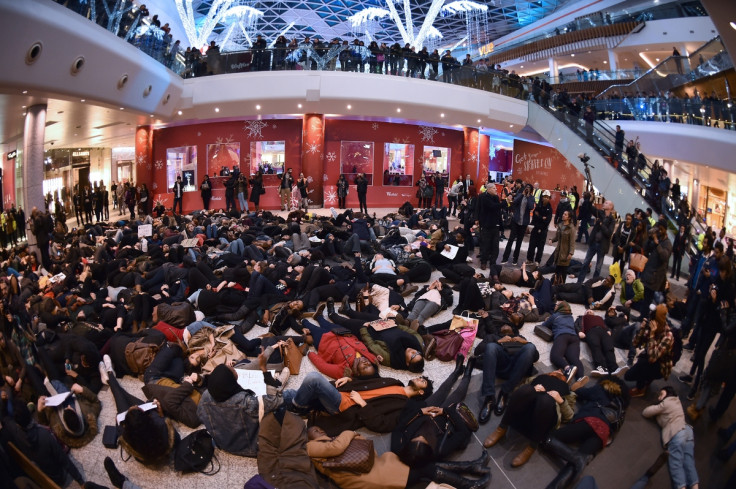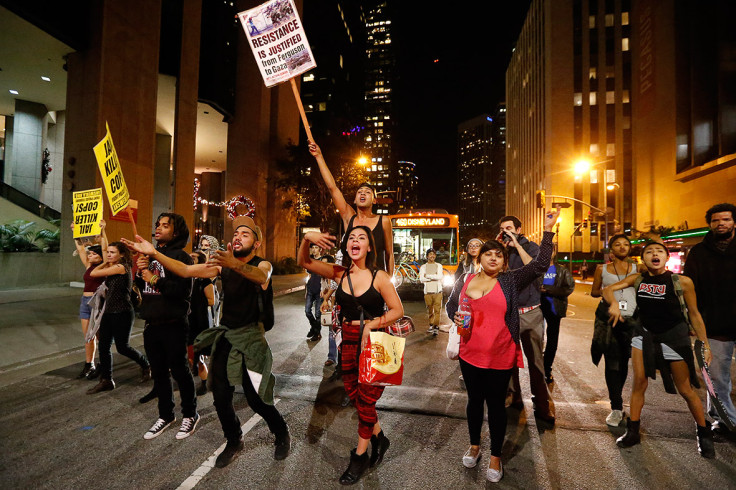Michael Brown and Eric Garner killings paint sad picture of US democracy

The official motto of the town of Ferguson is 'Proud past. Promising Future.' That vision now lies in ruins, amid unprecedented public protests sparked by the strangulation of Eric Garner and the shooting of Michael Brown.
These killings have led to palpable rage about the discriminatory treatment of black people by the police in the United States. There is no question that the events themselves, as well as the multifarious reactions to them, have much to do with serious race and power imbalances in the US.
But these events can also teach us a lot about the health of democracy in the United States.
Diagnosing the health of any country's democracy is rightly the domain of professionals and academics carrying out long-term analysis and employing batteries of time-worn indicators. Nevertheless, isolated incidents – like the gaping wound bleeding in America right now – can also remind us of things that indexes and long-term analyses may miss.
On 17July, the killing of Eric Garner on a Staten Island street was captured at close range on a video taken by a bystander. The disturbing scenes show police officers wrestling Garner to the ground in an attempt to arrest him, one of them putting him in a chokehold and later kneeling on the side of his head. Garner can be heard repeating the words 'I can't breathe' multiple times as officers continued to force him onto the ground. He died an hour later in hospital.
On 9August, Michael Brown was shot dead by police officer Darren Wilson. He was walking on a street in Ferguson, a suburb of St. Louis, Missouri, a few minutes after shoplifting a carton of cigarillos. After a struggle, Brown was shot at least six times at close range, twice in the head.
In both of these incidents the deceased were black, the perpetrators white.
On 24 November, it was announced that the grand jury had decided that Darren Wilson should not be prosecuted for Brown's death. Nine days later, a grand jury in New York came to the same conclusion in Garner's case.
Angry protests, some of them destructive but most peaceful, erupted across the United States. Racial tensions have fuelled mass action and protests not seen since the police beating of Rodney King in Los Angeles in 1991.
As it should, the public debate centres around race. The main grievances are unfair treatment of black people by the police and a broken justice system that protects the police perpetrators and devalues the lives of poor black victims.

But the debate could also be about democracy. A fully functioning democracy should prioritise the emancipation of all of its citizens from poverty, exclusion and ignorance. It should set as its core purpose the creation of a social arena in which citizens can thrive, in which the weak are protected and, crucially, in which human rights – of all stripes – form the boundaries of what a state can and cannot do. Where state agents overstep the mark, there are oversight mechanisms, consequences for perpetrators and justice for victims.
The killings of Brown and Garner, and the hundreds of thousands of stories of discrimination subsequently shared on social media (see hashtags #crimingwhilewhite, #blacklivesmatter and #icantbreath) reveal a police and prosecution system that is deeply flawed and discriminatory. While race is the lens through which this is now being viewed, that flaw says much more about a fundamental failure of USA's democracy – the failure to protect the right to equality.
A fully functioning democracy should prioritise the emancipation of all of its citizens from poverty, exclusion and ignorance.
It also points to a much broader and deeper chasm within USA's democracy. Across all spheres of economic, social and political life, there is a great and widening gap between those who own, control and influence; and those who beg, borrow and steal for a slice of the American Dream. The scale and breadth of the protests happening right now are evidence that US citizens – of all races – are feeling increasingly angry about this.
But the protests also reveal another side to US democracy. Basic civic freedoms – although clearly violated in these two police killings – are generally alive and well in the United States. Protests across the land have largely proceeded peacefully, and an online petition forced the President to announce $75 million for police body cameras.
The freedom to assembly and express views openly should not be taken for granted. Peaceful protest and creative nonviolent mobilisation can be extremely powerful tools in a democracy. Gene Sharp, one of the fathers of nonviolent mobilisation theory illustrates how citizens, acting peacefully, can do much more than speak up:
"Nonviolent action is a means of combat, as is war. It involves the matching of forces and the waging of 'battle,' requires wise strategy and tactics and demands of its 'soldiers' courage, discipline and sacrifice. This view of nonviolent action as a technique of active combat is diametrically opposed to the popular assumption that, at its strongest, nonviolent action relies on rational persuasion of the opponent, and more commonly it consists simply of passive submission. Nonviolent action is just what it says: action which is nonviolent, not inaction.'
Sharp's teachings have broad application in a situation where certain elements of a democracy, such as equality and accountability, are clearly dysfunctional, but others, such as civil liberties, remain largely intact. In such circumstances, nonviolent action can have a great effect. For the United States, the protests following the deaths of Michael Brown and Eric Garner could present an opportunity to begin to address some of the country's underlying democratic deficits.
When Barack Obama was elected in 2008 he declared that he would change the way that Washington does business. He hasn't. It is clear, however, that his successor in 2016 will have to take account of the growing discontent within large sections of society.
If current nonviolent action is sustained and organised over a period of years, that new president may be left with no choice but to bring about changes promised by so many before.
© Copyright IBTimes 2024. All rights reserved.






